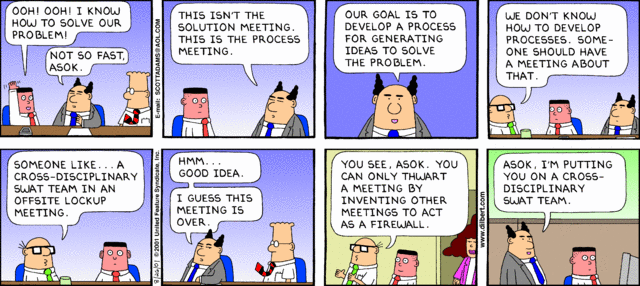“There is no true value of any characteristic, state, or condition that is defined in terms of measurement or observation.” – Dr. W. Edwards Deming.
The value depends on your operational definition.
Once you operationalize management ideas in a real organization it necessarily should have differences from how it is operationalized elsewhere. As Deming said there are no effective simple recipes for management. It is one of the frustrations people have with Dr. Deming: that there is no cookbook telling you what you should go do as a manager. You need to understand things like: interactions, variation, psychology, systems thinking, how we know what we know (and what we “know” that isn’t so). And then you need to make decisions about how to apply these concepts in your organization.
There is value in being able to think and discuss ideas in a broader context than your organization. You lose a great deal of learning opportunities if you can’t. And having common idea about what common principles a lean thinking organization or agile software organization should have is helpful I believe. That is aided by abstract ideals of these management practices.
One of agile’s guiding principles is individuals and interactions over processes and tools. I am a Deming follower and that emphasizes the importance of process and system. The words in agile are anti-process. But in my experience it is really a specific type of process – and that is basically idiotic adherence to process that the software developers are sick of. This attitude is best summed up in Dilbert. There are plenty of what I would call process in the practice of agile – sprints, kanban, work in process limits, define what done means, using user stories, retrospectives, build in quality… Basically I think it is important to understand what the principles mean, but don’t get locked into dogmatic ideas.
There are principles that seem to me necessary to, for example, consider an effort as lean management. There must be respect for people in lean management. If it isn’t there, then I don’t think it is lean. It might be management using some ideas and tools from lean, but it isn’t lean management. Exactly how respect for people is manifest is up to the organization. The same thing holds for other principles.
Thoughts on No True Agile, No True Lean, No True Latte
Related: Dr. Deming: There is No True Value – How to Manage What You Can’t Measure – Involve IT Staff in Business Process Improvement – The Illusion of Knowledge
On a personal level agile software development is the perfect melding of my career. My background is in Deming’s management ideas. I moved into software application development as the easiest way to quickly improve organizations by taking advantage of technology and process improvements possible with new applications. And then agile software development came around and it is extremely close to the ideas of Deming and lean with a slant toward the software developers mode of thinking and working and leaving a bit of the background and a bit of the stuff related more relevant to managers (especially executives) off.
But actual agile software development practice (in its many forms) has a closer match to the ideas I have championed than what I have seen in quality, lean manufacturing, management excellence… efforts. I do believe there are lean manufacturing efforts that have done so very well, i is just my first hand experience has been much more with agile software development. I happen to think the efforts would be enhanced with a bit more of understanding of lean manufacturing concepts and Deming’s ideas but excellent progress has been made with limited efforts to bring those ideas in. It seems to me, often people move into looking at the ideas as they get more comfortable with agile and want to build on what they have accomplished.
The move to Kanban, one piece flow… in software development is a great example of this in practice. There are also people that have been subjugated to painful pointy haired boss led “lean” or “six sigma” efforts and will fight any attempt to even consider such ideas. I can understand their feelings.




Physical characteristics, like mass, have a true value because they are defined in terms of a theory, mechanics, and not a measurement procedure. We know that all measurements are approximations of the true value. The Cost Of Goods Sold (COGS), on the other hand, is defined by the formula used to calculate it and I think that’s the distinction Deming had in mind.